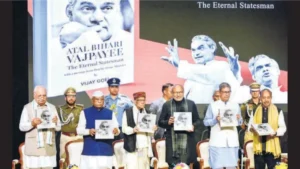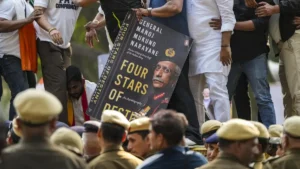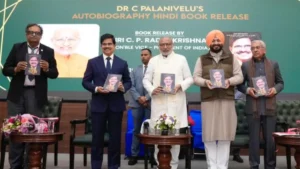Renowned author M.J. Akbar, along with co-author K. Natwar Singh, launched a new book titled “Gandhi: A Life in Three Campaigns.” This book was unveiled at a significant event hosted by Nripendra Misra, Chairman of the Executive Council of the Prime Minister’s Museum and Library Society, at the Prime Minister’s Museum and Library at the Pradhan Mantri Sangrahalaya.
Content and Theme
The book delves into the life and struggles of Mahatma Gandhi, particularly focusing on three pivotal mass campaigns he led:
- Non-Cooperation Movement (1920): Highlighting Gandhi’s ability to mobilize the masses against British rule.
- Salt Satyagraha (1930): Turning a pinch of salt into a symbol of resistance against colonial exploitation.
- Quit India Movement (1942): A decisive call for the end of British colonialism in India.
These campaigns are portrayed as crucial moments that challenged and eventually led to the dismantling of the British Empire in India.
Insights from the Book Launch
National Security Advisor Ajit Doval, at the book launch, praised Gandhi’s use of ‘soft power’ as a strategic tool against colonial rule. He described Gandhi’s political approach as inclusive, transcending conventional notions of soft and hard power, and coined it as “smart power.” Doval emphasized Gandhi’s ability to use moral force to bring a more powerful adversary to its knees, comparing it to military victories where lesser powers overcame greater ones.
Foreword by K. Natwar Singh
The book’s foreword, written by co-author K. Natwar Singh, a former diplomat and External Affairs Minister of India, sets the tone for a deep exploration of Gandhi’s life and philosophy.
Importance of the Book
- Educational Resource: An invaluable resource for students and scholars of history, politics, and Gandhi’s philosophy.
- Relevance to Contemporary Issues: Offers insights into the effectiveness of nonviolent resistance in political struggles.
- Global Perspective: Sheds light on the impact of Gandhi’s strategies on world history and contemporary political movements.
This book is not just a biography but an analytical exploration of Gandhi’s strategies and their effectiveness in the face of colonial power, making it a significant contribution to the literature on Mahatma Gandhi and Indian history.
Important Questions Related to Exams
Q1. Who is the author of the book “Gandhi: A Life in Three Campaigns”?
a) Arundhati Roy
b) Ramachandra Guha
c) M.J. Akbar
d) K.N. Panikkar
Q2. What is the main focus of “Gandhi: A Life in Three Campaigns”?
a) Gandhi’s early life in South Africa
b) Gandhi’s role in the Indian independence movement
c) The personal life of Mahatma Gandhi
d) Gandhi’s philosophy of non-violence
Q3. “Gandhi: A Life in Three Campaigns” mainly illustrates Gandhi’s leadership in which of the following?
a) Education and health
b) Economic development
c) Nationalist movements
d) Environmental conservation
Q4. What significant impact of Gandhi’s strategies is a focus in the book?
a) Educational reform in India
b) Dismantling of the British Empire in India
c) Development of rural India
d) Establishment of peace between different communities
Check your knowledge and try to answer the questions in the comment section.




 VP C. P. Radhakrishnan Unveils 'Atal Bih...
VP C. P. Radhakrishnan Unveils 'Atal Bih...
 Four Stars of Destiny: An Autobiography ...
Four Stars of Destiny: An Autobiography ...
 Vice-President Releases Hindi Edition of...
Vice-President Releases Hindi Edition of...








